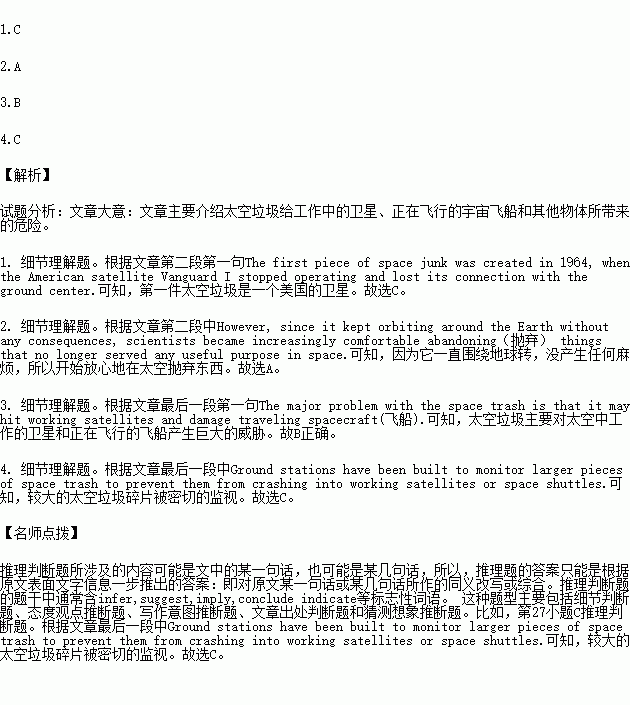题目内容
Space is where our future is — trips to the Moon, Mars and beyond. Most people would think that aside from comets(彗星) and stars, there is little else out there. But, since our space journey started we have left so much trash(垃圾) there that scientists are now concerned that if we don’t clean it up, we may all be in mortal(致命的) danger.
The first piece of space junk was created in 1964, when the American satellite Vanguard Ⅰ stopped operating and lost its connection with the ground center. However, since it kept orbiting around the Earth without any consequences, scientists became increasingly comfortable abandoning(抛弃) things that no longer served any useful purpose in space.
It is estimated(估计) that there are now over 500,000 pieces of man-made trash orbiting the Earth at speeds of up to 17,500 miles per hour. The junk varies from tiny pieces of paint chipped off rockets to cameras, huge fuel tanks, and even odd items like the million-dollar tool kit that astronaut Heidemarie Stefanyshyn Piper lost during a spacewalk.
The major problem with the space trash is that it may hit working satellites and damage traveling spacecraft(飞船). Moreover, pieces of junk may collide(碰撞) with each other and break into pieces which fall back to the Earth. To avoid this, scientists have invented several ways for clearing the sky. Ground stations have been built to monitor larger pieces of space trash to prevent them from crashing into working satellites or space shuttles. Future plans include a cooperative effort among many nations to stop littering in space and to clean up the trash already there.
1.What was the first piece of man-made space trash?
A. A camera.B. A tool kit.
C. A broken satellite.D. A fuel tank.
2.Why were scientists NOT concerned about space trash in the beginning?
A. It did not cause any problems.
B. It no longer served any useful purpose.
C. It was millions of miles away from the Earth.
D. It was regarded as similar to comets and stars.
3.Which of the following statements is true about space junk?
A. It is huge, heavy machines.
B. It may cause problems for space shuttles.
C. It floats slowly around the Earth.
D. It never changes position.
4.What has been done about the space trash problem?
A. Ground stations are built to help store the trash properly in space.
B. Many nations have worked together to stop polluting space.
C. Large pieces of space trash are being closely watched.
D. Scientists have cleaned up most of the trash.
 应用题作业本系列答案
应用题作业本系列答案假定你是李华,目前正处于高三阶段。与你同为高三的好友李杰写信向你征求如何为高考做准备。你给他写一封回信谈谈高考备考的注意事项并陈述你的理由:
注意事项 | 理由 |
1. 保持良好的心态 2. 目标明确 3. 与父母、老师或同学沟通 4. 作息合理,饮食均衡 | 1. 有助于减轻焦虑,还能增强克服困难的勇气 2. 正确评价自己 3. …… 4. …… |
注意: 1. 词数100左右 , 开头已为你写好(不计入总词数);
2. 可适当增加细节, 以使行文连贯。
3. 参考词汇: 明确的 (definite) 评价(estimation)
Dear Li Jie ,
I have received your letter. No doubt every Senior 3 student wishes to be successful in the National College Entrance Examination. _____________
____________________________________________________________________________________
Yours,
Li Hua

